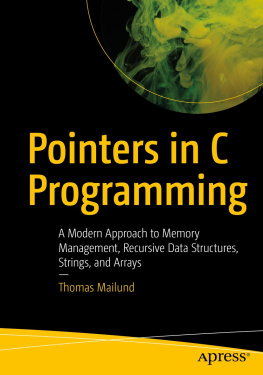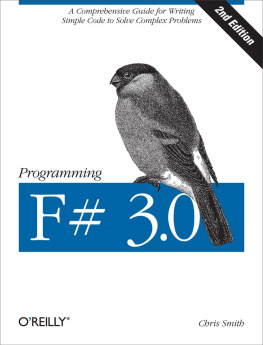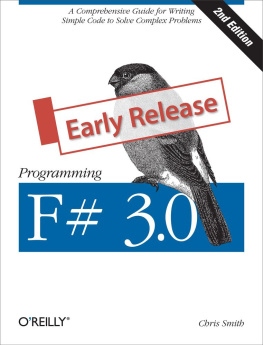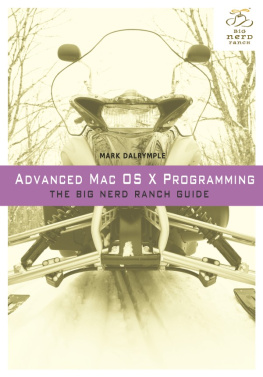C#
Advanced Guide to Learn C# Programming Effectively
Copyright 2020 - All rights reserved.
The content contained within this book may not be reproduced, duplicated or transmitted without direct written permission from the author or the publisher.
Under no circumstances will any blame or legal responsibility be held against the publisher, or author, for any damages, reparation, or monetary loss due to the information contained within this book, either directly or indirectly.
Legal Notice:
This book is copyright protected. It is only for personal use. You cannot amend, distribute, sell, use, quote or paraphrase any part, or the content within this book, without the consent of the author or publisher.
Disclaimer Notice:
Please note the information contained within this document is for educational and entertainment purposes only. All effort has been executed to present accurate, up to date, reliable, complete information. No warranties of any kind are declared or implied. Readers acknowledge that the author is not engaging in the rendering of legal, financial, medical or professional advice. The content within this book has been derived from various sources. Please consult a licensed professional before attempting any techniques outlined in this book.
By reading this document, the reader agrees that under no circumstances is the author responsible for any losses, direct or indirect, that are incurred as a result of the use of information contained within this document, including, but not limited to, errors, omissions, or inaccuracies.
Table Of Contents
Introduction
Object-oriented programming is like a rabbit hole; once you start to explore it, the tunnel only seems to get deeper and deeper. This is especially true because of the family of programming languages whose cores are based on object-oriented techniques and principles. C++, C, Java, Javascript, PHP, Visual Basic, Microsoft .NET, Ruby, Scala, and a bunch of other programming languages are all classified as OOPL (Object-Oriented Programming Languages). In this language family, C# is similar to that sibling who is difficult to get along with but incredibly resourceful. C# is alluring and fascinating to some people, while to others, it is a real hassle to learn and work with this language, but none of these two people at the opposite ends of the spectrum are to blame.
People familiar with mainstream OOPL, such as C++, will find that C# has all those bells and whistles that you would find in other object-oriented languages, ultimately making it easier to learn C#, but even with these similarities, the implementation of the same techniques, tools, and concepts are radically different, and on top of that, C# does not have one defined IDE, anyway. At the same time, you can argue that no programming language has one IDE thats better than the rest. Still, in the case of C#, the result is an inconsistency in the programming experience, not the case for other languages. Hence, trying to teach the reader a universal set of techniques and practices is quite literally impossible. Even the fundamental concepts may be different, even though you may be familiar with them from other object-oriented languages.
For this very reason, the first chapter of the book is essentially a review of the most important programming concepts in C#. In this way, since all the readers will likely read this chapter before moving on, everyone will have the same idea of the concepts that are being explained and used in the upcoming chapters. This is very important because literally, every discussion being made after chapter 1 builds upon the concepts that are highlighted at the very beginning. Even if the reader already knows about all the concepts discussed in the first chapter, the chapter itself does not become useless because it will still serve as an opportunity to review the knowledge that they already possess. If theres something that is not clear or is ambiguously explained, then do a brief web-search. Theres a high chance that you might just need a small detail to understand whats being discussed in the topic.
Chapter 1: Getting Familiar with the Foundations of C#
This chapter will provide the reader with an overall review of the most important concepts in C sharp. This is necessary because the upcoming chapters will build upon the things we review here. This allows the readers to become familiar with the idioms commonly used in advanced C sharp programming (which will be quite frequently used in the upcoming chapters). In this way, this chapter hopes to get the readers on the same page before we move on with advanced programming techniques and projects in the latter half of this book.
However, if you already have experience with object-oriented programming languages like Java, Javascript, C++, PHP, Visual Basic .NET, etc., you might think this chapter will probably not be worth your time, but this chapter will prove to be a really useful checkpoint where you can review the concepts you are already familiar with. On the other hand, most readers picking up this book will find this chapter to disclose certain aspects of not only C sharp but also .NET programming that they were previously unaware of.
In short, the content here will provide the readers with foundations necessary for understanding the discussion of C sharp programming to create advanced applications throughout the course of this book.
The Essentials of an Object-Oriented Programming Language
There is a set of fundamental elements that form the core of the language itself in any object-oriented programming language. These elements are generally known as the object-oriented basics, but this title is quite misleading as these basics are not to be underestimated. To be more precise, these basics are wrapped around with an external shell that gives the object-oriented language its unique identity. This is why C sharp, even though it is an object-oriented language like C++, Visual Basic, and Java, has its own unique way of distinguishing itself from its family members.
In any object-oriented programming language, the underlying functioning principles remain the same. These principles are essentially the basics of an object-oriented programming language, and they are a total of four. These basic principles are the following:
Encapsulation
Inheritance
Aggregation
Polymorphism
As such, any programming language that incorporates these principles is categorized as an object-oriented programming language. In order to implement each of these principal elements properly within their cores, programming languages use tools known as idioms and constructors . For instance, these include
Templates
Operator overloading
Interfaces
Multithreading
Multiple Inheritance
Exception handling
Pointers
Garbage collection, etc.
When exploring C sharp, we find out that the core of this object-oriented programming language implements the principal elements with operator overloading, inheritance, interfaces, exception handling, garbage collection, multiple interface inheritance, reflection, and multi-threading, but you might notice that C sharp shuns a few functionalities such as templates, raw pointers, and even multiple class inheritance. The reason why these functionalities were not included within the C sharp programming language is because of the argument, which, on one side, supports the claim that these features introduce more problems than they can potentially solve. On the other side, the belief is that these are key components of any object-oriented programming language, and the features they bring to the table are priceless, and they need to be included, but keep things simple and straightforward, further complications were avoided by simply not adding these features to C sharp.











